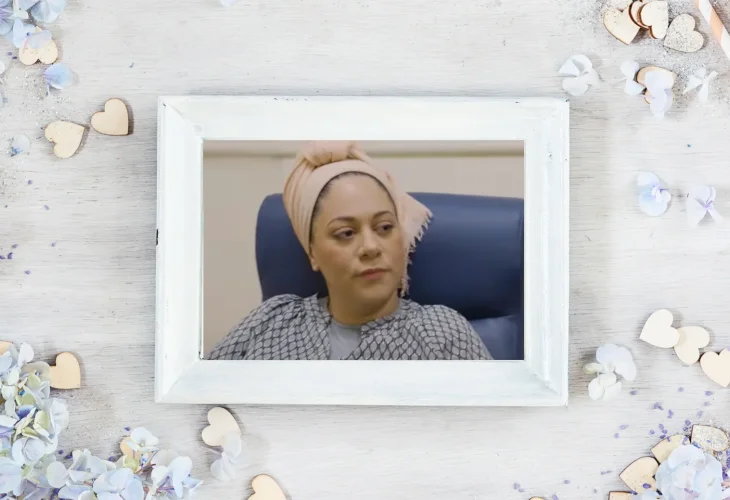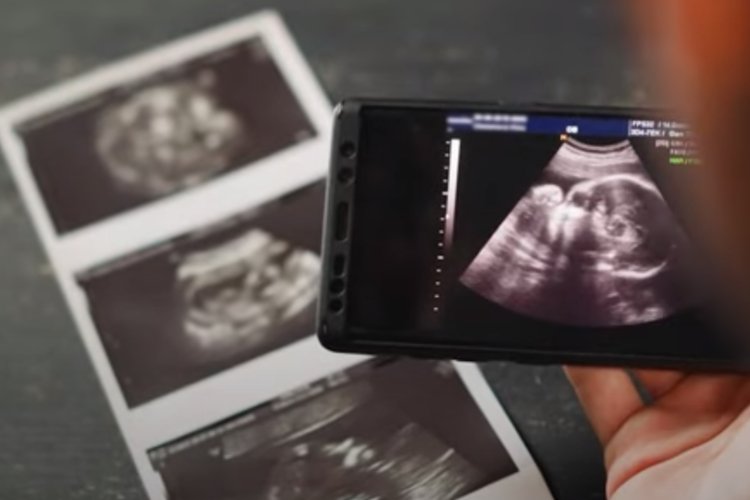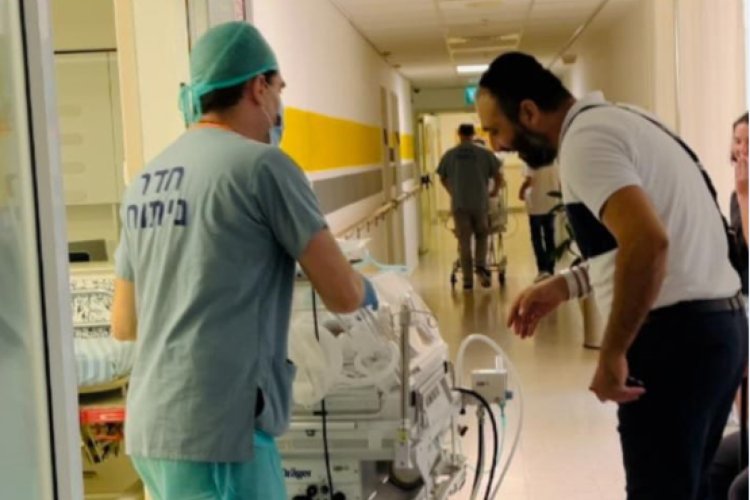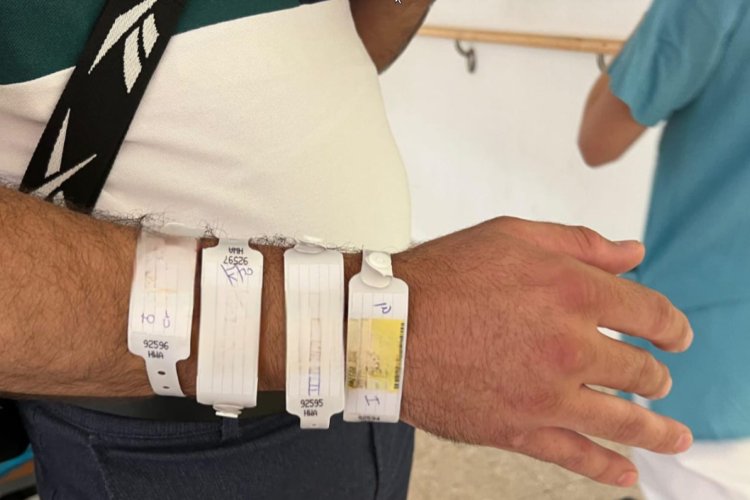A Journey of Faith: A Mother's Story of Miracles and Multiples
Shelly Hakimi faced many ups and downs, fear and joy, until the birth of her quadruplets two weeks ago. What gave her the strength to persist, and what divine gifts did she discover along the way?
 (Inset: Shelly Hakimi)
(Inset: Shelly Hakimi)"It's been two weeks, and I still can't process it," begins Shelly Hakimi with a wide smile, struggling to grasp the journey she's endured over the past seven months. Four babies were born one after the other: first two boys, then two girls. Along with them, the tension and worries that accompanied this rare pregnancy vanished—a journey that started with total shock and continued with the firm decision not to reduce. Shelly’s heart faced many highs and lows, but she never gave up, steering her way through a sea of uncertainties. And there were also special gifts from above that could not be missed.

"I Prayed for Twins"
Until about eight months ago, Israel and Shelly Hakimi were parents to only two children. "On the first night of Chanukah, I prayed for twins, quietly, to myself," she shares. A few weeks later, the news of a quadruplet pregnancy was a complete surprise. "Israel almost fainted; it was a total shock. We sat in the car, not knowing how to process the news."
Soon after, waves of emotions started to storm within her heart. "It was quite confusing," Shelly describes. "One day I was happy with the good news, and the next I thought to myself 'Oh my, this is scary—what am I going to do with this?' Even after we accepted that this was our path and decided not to reduce, it wasn't easy. Sometimes the fear was intense, sometimes the joy. In advanced stages, I still feared, but I felt I had been blessed with something huge and strong. I continued to believe and pray that the pregnancy would end with full hands."
What led you to decide to keep all of them and not reduce?
"Halachically, it's permissible to reduce in such a situation, so the pregnancy doesn't pose a danger to the mother or the other fetuses. But we couldn't bear the thought of having to remove one of the children. How can you even choose whom to remove? Each one is a soul of their own. It was a dreadful, tearing decision. Therefore, we decided that as long as everything is fine and the fetuses are developing, there was no reason to touch them."

What was the doctors' reaction?
"From the very first moment we received the news, my husband and I prayed to Hashem to send us good messengers throughout the journey. That they wouldn't bother us or bring us down with frightening statistics and various threats. And we indeed had special divine assistance in this matter. Almost every doctor we met accepted our decision positively and did everything possible to help. I saw in this supportive professional environment the hand of Hashem."
Did doubts arise again during the journey?
"No. We stuck to our decision completely, and we had a good feeling from the start, an inner knowing that everything would be okay. Of course, we're human, and the fears and tough thoughts sometimes took over, but we managed to separate them from the healthy condition of the fetuses, from the knowledge we were being watched over from above. My husband always told me, 'Hashem is behind you, all of Israel is behind you,' and the precise timing of such a special pregnancy during a time of war only strengthened this feeling. I felt it wasn't by chance that at a time when so many lives are lost, I was able to bring new life into the world with such strength. I saw merit in the ability to continue our people, especially after other lives were cut short. I wasn't always at the height of faith; I fought for it."
How do you fight for faith?
"Through a lot of conversations together. Whenever the cries, concerns, and fears started to rise, my husband and I would sit down, talk, and encourage each other. When I poured out my heart, we drew strength from it. When he sat and worried, I comforted him. It says 'to declare your lovingkindness in the morning, and your faithfulness every night,' and that's exactly how it was for us. During the day, everything was clear; the faith was strong, and I knew we would meet the challenge. But as soon as evening came, worries threatened to devour everything from every direction. So, we'd sit and talk, let it all out, and cry, and this joint strength carried us through the journey."
Besides the mutual conversations, reinforcements also came from outside. "We spoke often with our rabbi, and he gave us strength. And, of course, our family, and my special mother, supported us throughout the way."
"What If It Ends Well?"
So, despite the fears, Shelly focused on only one possibility. "I had an ultrasound every two weeks, and in-between, I lived on islands of uncertainty. We had no idea what would happen tomorrow, the day after, or even in an hour. Never in my life had I experienced such great uncertainty," she says. "In those moments, the only one with me was Hashem. At every moment I felt against the wall, I knew I had to look up and pray. From this, a deep connection with Him formed, built from within and strengthened by those around me."

You successfully reached the end of the critical phase with full hands, but the children's development stage is still ahead. Do you think about it?
"The prayers for divine help don’t end, but I’m not ready to predict doom. Yes, my children were born prematurely, but still, it's not an option for me to get sucked into fears. I believe in the good, so when tough thoughts come—and they do—I give them space, but then I return to a positive place and move on. What good does it do to worry now about what might or might not be? Worries only weaken, and that's exactly what the evil inclination wants."
You have a strong presence of faith in the good, but what if the whole story had ended differently?
"The question I carried with me was exactly the opposite—'What if it ends well?' Precisely because of this question, we were able to hold the pregnancy without losing a single child. It's not that we run the world—it’s not in our hands nor the doctors'—but we did our part, and seeing the good allowed this miraculous outcome to come to fruition."
It seems Hashem knew exactly who to give the challenge to. "Aside from the pregnancy issue, over the years many people have told me I’m naïve and innocent," Shelly says, "and I—I’m fine with being in this innocence, this positive view. It’s not like optimists don’t fall. Since the birth, every night, I turn off the light, put my head on the pillow, and worry. I cry, release, let the fears out; I don’t sweep them under the bed. I never said nothing would break me—I’m also small and scared—but after the pain has its place, I return to believing in the good, and thank God, I also get to see it."
What do you have to say to others facing challenges during pregnancy?
"It's important to remember that we’re not running the world; we only do our best. Even doctors aren’t running the world, so it’s essential to get medical opinions, along with Torah guidance. When you take things in the right perspective and know that everything is in Hashem's hands, it gives strength to face challenges."
How do you see the future of raising your children?
"First of all, I pray, also for the older children at home who need their attention. There’s so much beyond just the technical care of quadruplets. In general, I say to the Creator, 'You brought this, you’ll take care of it.' Even now, you can see how He’s taking care of it; there’s an amazing mobilization from many people around. Since the birth, the phone hasn’t stopped ringing with offers to help from good people. We are blessed to be part of a holy community that just waits and wants to hear good news. People are happier with us, especially in this time when we’ve already had enough sorrow. "
In conclusion, Shelly says: "From this great joy, I wish everyone to experience happiness, a thriving lineage without any suffering or hindrances, and that we continue to grow and prosper the people of Israel together."

